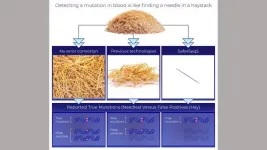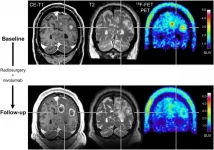INFORMATION:
The study was led by WCS Senior Conservation Scientist Tim McClanahan and will appear in Volume 128 of the journal Marine Policy. The work was supported by Bloomberg Philanthropies, The Tiffany & Co. Foundation, and the John D. and Catherine T. MacArthur Foundation.
WCS (Wildlife Conservation Society)
MISSION: WCS saves wildlife and wild places worldwide through science, conservation action, education, and inspiring people to value nature. To achieve our mission, WCS, based at the Bronx Zoo, harnesses the power of its Global Conservation Program in nearly 60 nations and in all the world's oceans and its five wildlife parks in New York City, visited by 4 million people annually. WCS combines its expertise in the field, zoos, and aquarium to achieve its conservation mission.
This year at CBD CoP15, the Parties to the Convention on Biological Diversity (CBD) will adopt a post-2020 global biodiversity framework, and set shared goals and action-oriented targets to provide the momentum for conservation action at multiple scales. This is a critical policy moment to improve global goals and targets related to coral reefs, including their clarity and the indicators to be used to measure progress, to drive conservation action that effectively conserves coral reef biodiversity and ensures socio-economic benefits at relevant scales. WCS supports the global efforts to ensure that CBD Parties commit to protecting or conserving least 30% of land and sea areas by 2030 through area-based conservation measures, read more about our recommendations here.
For more than 70 years WCS has been on and underwater studying coral reefs. Today there is a global crisis for coral reefs facing pressures from climate change, pollution, unsustainable tourism, and destructive fishing. From Kenya to Belize, Mozambique to Cuba, WCS is conserving reef biodiversity hotspots and supporting communities that depend on reefs to survive. We currently work across 16 countries to protect coral reefs and ensure that they continue to provide for the people and species that rely on them.
Visit: newsroom.wcs.org Follow: @WCSNewsroom. For more information: +1 347-840-1242.
Breakthrough study shows no-take marine reserves benefit overfished reefs
Findings support global "30 by 30" goal of protecting 30 percent of the ocean by 2030
2021-05-04
(Press-News.org) New York, NY (May 4, 2021) - A powerful, long-term study from WCS adds scientific backing for global calls for conserving 30 percent of the world's ocean. The studied no-take marine protected areas (MPAs) increased the growth of fish populations by 42 percent when fishing was unsustainable in surrounding areas, achieving the benefits of stable and high production of fish populations for fishers, while protecting threatened ecosystems.
The study recorded fish catches for 24-years across a dozen fish landing sites within two counties in Kenya, which allowed scientists to evaluate the long-term impacts of two different fisheries management methods. While one county utilized a no-take MPA covering 30 percent of the fishery, the other focused on gear restrictions and prohibited the use of small-mesh nets.
The differences in outcomes for the fishers and the ecosystems were stark. Per-person daily catches rose 25 times faster near the no-take MPA than in fished areas with gear restrictions, showing that no-take MPAs were far more effective at sustaining stocks of fish than restricting destructive gear.
The study's lead author Dr. Tim McClanahan, Senior Coral Reef Scientist for WCS said "The no-take area in Mombasa occupied 30 percent of the studied fishing grounds. Fortuitously, this is the target for protection being proposed for the oceans, which is rarely tested and based on the results of simulation models. The empirical support for the models and the conservation proposal is reassuring along with the unexpected results of increased production of fish populations that compensated for the lost fishing area. This adds to the evidence that no-take protected areas of sufficient coverage may compensate for the lost fishing grounds, particularly when fisheries are not sustainably fished."
This new study from WCS represents the longest-ever continuous detailed fish catch record for coral reefs, and reveals patterns that took nearly 20 years to unfold due to the small annual increments of change. The time and resources it takes to complete these empirical studies has long been an impediment to testing the effectiveness of no-take MPAs on fisheries, and is also why simulation models were commonly used. Until this publication, most existing empirical studies were short-term and focused on the catch per fisher rather than the catch per area, which is a critical metric of sustainable yield estimates. Consequently, there is a compelling need to expand long-term studies to better calibrate and test fisheries production models.
This study shows that MPAs where no-take rules are followed can compensate for lost fishing grounds and stocks and therefore help people highly dependent on fish for income and nutritional security that is lost when catches are unsustainable. While gear restrictions did have positive benefits for short periods of time, they did not maximize fisheries production over the long-term. Some combination of closure and gear restrictions are therefore likely needed to achieve the full benefits to both fishers and ecosystems.
ELSE PRESS RELEASES FROM THIS DATE:
Juvenile incarceration has mixed effects on future convictions
2021-05-04
Harsh prison sentences for juvenile crimes do not reduce the probability of conviction for violent crimes as an adult, and actually increase the propensity for conviction of drug-related crimes, finds a new study by economists at UC Riverside and the University of Louisiana. Harsh juvenile sentences do reduce the likelihood of conviction for property crimes as an adult. But the increase in drug-related crimes cancels out any benefit harsh sentences might offer, researchers found.
"Juvenile incarceration is a double-edged sword which deters future property crimes but makes drug convictions more likely in adulthood. Thus, it's hard to make firm policy recommendations ...
Your stomach may be the secret to fighting obesity
2021-05-04
Scientists believe a stomach-specific protein plays a major role in the progression of obesity, according to new research in Scientific Reports. The study co-authored by an Indiana University School of Medicine researcher, could help with development of therapeutics that would help individuals struggling with achieving and maintaining weight loss.
Researchers focused on Gastrokine-1 (GKN1) -- a protein produced exclusively and abundantly in the stomach. Previous research has suggested GKN1 is resistant to digestion, allowing it to pass into the intestine and interact with microbes in the gut.
In the Scientific Reports study, researchers show that inhibiting GKN1 produced significant differences in weight and levels of body fat in comparison to when the protein was expressed.
"While ...
Hopkins-led research team takes gene mutation detection in blood to the next level
2021-05-04
Next-generation gene sequencing (NGS) technologies --in which millions of DNA molecules are simultaneously but individually analyzed-- theoretically provides researchers and clinicians the ability to noninvasively identify mutations in the blood stream. Identifying such mutations enables earlier diagnosis of cancer and can inform treatment decisions. Johns Hopkins Kimmel Cancer Center researchers developed a new technology to overcome the inefficiencies and high error rates common among next-generation sequencing techniques that have previously limited their clinical application.
To correct for these sequencing errors, the research team from the Ludwig Center and Lustgarten Laboratory at the Johns Hopkins ...
HEPA filter effectively reduces airborne respiratory particles generated during vigorous exercise
2021-05-04
ROCHESTER, Minn. -- A pair of Mayo Clinic studies shed light on something that is typically difficult to see with the eye: respiratory aerosols. Such aerosol particles of varying sizes are a common component of breath, and they are a typical mode of transmission for respiratory viruses like COVID-19 to spread to other people and surfaces.
Researchers who conduct exercise stress tests for heart patients at Mayo Clinic found that exercising at increasing levels of exertion increased the aerosol concentration in the surrounding room. Then also found that a high-efficiency particulate air (HEPA) device effectively filtered out the aerosols and decreased the time needed to ...
With new treatments, PET imaging adds valuable information to brain metastasis monitoring
2021-05-04
Reston, VA--For patients with brain metastases, amino acid positron emission tomography (PET) can provide valuable information about the effectiveness of state-of-the-art treatments. When treatment monitoring with contrast-enhanced magnetic resonance imaging (MRI) is unclear, adding 18F-FET PET can help to accurately diagnose recurring brain metastases and reliably assess patient response. This research was published in The Journal of Nuclear Medicine.
Newer treatment options for patients with brain metastases--such as immune checkpoint inhibitors and targeted therapies--are effective, but can cause a variety of side effects. ...
Immunomics: A conversation on the future of diagnostics with Ramy Arnaout
2021-05-04
The human immune system doesn't just protect our health, it reflects it. Each encounter with a potential disease-causing agent causes the body to produce specific immune agents -- proteins known as antibodies and T-cell receptors -- tailor-made to recognize and destroy the invader. Tasked with preventing re-infection, antibodies and T-cell receptors (TCR) from your previous encounters circulate throughout the body indefinitely, like a record of your personal medical history that you carry inside of you.
Clinical pathologist Ramy Arnaout, MD, DPhil, ...
Emergency physicians first to safely treat vaccine-induced blood clot with heparin alternative
2021-05-04
WASHINGTON, DC -- A new case report, detailed in Annals of Emergency Medicine, is the first known case of a patient with VITT (vaccine-induced thrombotic thrombocytopenia) treated with a heparin alternative following the Centers for Disease Control and Prevention (CDC) guidance.
An otherwise healthy female patient in her 40s came to the emergency department at UCHealth University of Colorado Hospital twelve days after receiving the Johnson & Johnson vaccine with a headache, dizziness, and vision changes. The patient was treated on April 13, 2021, the same day that the Centers for Disease Control and Prevention (CDC) announced a pause in the administration of the Johnson & Johnson vaccine. CDC guidance recommended ...
The sensitive brain at rest
2021-05-04
You know that raw overwhelm people have been reporting after months of a pandemic, compounded by economic issues and social unrest? Does fatigue and compulsive social media scrolling strike a familiar chord?
Those brittle feelings offer us a glimpse into what regular life can be like for individuals with sensory processing sensitivity (SPS), a biological trait possessed by roughly a third of the population. In a world of constant information overload and stress, it's a characteristic that can result in a variety of behaviors, from emotional outbursts to withdrawal, overwhelm and procrastination.
"Behaviorally, we observe it as being more careful and cautious when approaching new things," said Bianca Acevedo, a researcher ...
New GSA Bulletin articles published ahead of print in April
2021-05-04
Boulder, Colo., USA: The Geological Society of America regularly publishes
articles online ahead of print. For April, GSA Bulletin topics
include multiple articles about the dynamics of China and Tibet; the Bell
River hypothesis that proposes that an ancestral, transcontinental river
occupied much of northern North America during the Cenozoic Era; new
findings in the climatic history during one of the Earth's coldest periods:
The Late Paleozoic Ice Age; and the age an nature of the Chicxulub impact
crater. You can find these articles at END ...
A calculator that predicts risk of lung cancer underperforms in diverse populations
2021-05-04
PHILADELPHIA - Lung cancer is the third most common cancer in the U.S. and the leading cause of cancer death, with about 80% of the total 154,000 deaths recorded each year caused by cigarette smoking. Black men are more likely to develop and die from lung cancer than persons of any other racial or ethnic group, pointing to severe racial disparities. For example, research has shown that Black patients are less likely to receive early diagnosis and life-saving treatments like surgery. Now researchers at Jefferson have found that a commonly used risk prediction model does not accurately identify high-risk Black patients who could gain life-saving benefit from early screening, and paves the way for improving screenings and guidelines. The research was published in JAMA Network ...
LAST 30 PRESS RELEASES:
Wildfire smoke linked to rise in violent assaults, new 11-year study finds
New technology could use sunlight to break down ‘forever chemicals’
Green hydrogen without forever chemicals and iridium
Billion-DKK grant for research in green transformation of the built environment
For solar power to truly provide affordable energy access, we need to deploy it better
Middle-aged men are most vulnerable to faster aging due to ‘forever chemicals’
Starving cancer: Nutrient deprivation effects on synovial sarcoma
Speaking from the heart: Study identifies key concerns of parenting with an early-onset cardiovascular condition
From the Late Bronze Age to today - Old Irish Goat carries 3,000 years of Irish history
Emerging class of antibiotics to tackle global tuberculosis crisis
Researchers create distortion-resistant energy materials to improve lithium-ion batteries
Scientists create the most detailed molecular map to date of the developing Down syndrome brain
Nutrient uptake gets to the root of roots
Aspirin not a quick fix for preventing bowel cancer
HPV vaccination provides “sustained protection” against cervical cancer
Many post-authorization studies fail to comply with public disclosure rules
GLP-1 drugs combined with healthy lifestyle habits linked with reduced cardiovascular risk among diabetes patients
Solved: New analysis of Apollo Moon samples finally settles debate about lunar magnetic field
University of Birmingham to host national computing center
Play nicely: Children who are not friends connect better through play when given a goal
Surviving the extreme temperatures of the climate crisis calls for a revolution in home and building design
The wild can be ‘death trap’ for rescued animals
New research: Nighttime road traffic noise stresses the heart and blood vessels
Meningococcal B vaccination does not reduce gonorrhoea, trial results show
AAO-HNSF awarded grant to advance age-friendly care in otolaryngology through national initiative
Eight years running: Newsweek names Mayo Clinic ‘World’s Best Hospital’
Coffee waste turned into clean air solution: researchers develop sustainable catalyst to remove toxic hydrogen sulfide
Scientists uncover how engineered biochar and microbes work together to boost plant-based cleanup of cadmium-polluted soils
Engineered biochar could unlock more effective and scalable solutions for soil and water pollution
Differing immune responses in infants may explain increased severity of RSV over SARS-CoV-2
[Press-News.org] Breakthrough study shows no-take marine reserves benefit overfished reefsFindings support global "30 by 30" goal of protecting 30 percent of the ocean by 2030


